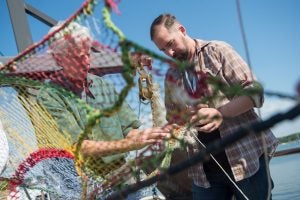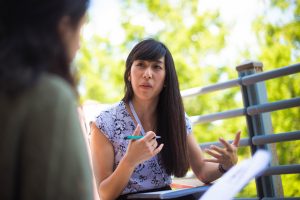A Question of Degree: How 2o Celsius is Changing the World
The Intergovernmental Panel on Climate Change has warned that a 2 degree Celsius increase in global average temperatures will be a tipping point for life as we know it, triggering massive sea level rise, ecosystem shifts, and a greater frequency of extreme weather around the globe.
Four years after the landmark Paris Agreement, almost every nation has agreed to limit global temperature rise to “well below 2 degrees Celsius,” yet many areas of the U.S. and other regions of the world have already reached or surpassed this amount of warming. Rhode Island, the site of Metcalf Institute’s Annual Science Immersion Workshop for Journalists, is one of these hot spots.
These extreme temperature increases create complicated interactions for water supply, food security, ecosystems, public health, and the economy. Do you have the tools to accurately report on these interactions? Can you translate complex research, scientific journal articles and data-rich information into compelling stories that satisfy your editors and hit home for your news audience?
The University of Rhode Island’s Metcalf Institute is accepting applications for its 22nd Annual Science Immersion Workshop for Journalists, June 7-12, 2020. Thanks to the generosity of private donors and Metcalf Institute’s endowment, ten journalists will be awarded fellowships that include tuition, room and board, and travel support.

About the Workshop
The Metcalf Institute Workshop provides journalists with hands-on experience and expertise from leading scientists, policymakers, and communicators who are working to project the impacts of climate change, identify adaptation measures, and investigate the most effective ways to communicate these challenges. Workshop topics are carefully selected to offer widespread relevance through local, regional, and national (U.S.) examples. It’s a unique and intense week of learning in the field, classroom and lecture hall for journalists who rarely get the time for in-depth study.
Metcalf Fellows:
- Receive a comprehensive overview of climate change science
- Gain a deeper understanding of how scientists conduct research and address scientific uncertainty
- Develop the skills and confidence to translate the language of scientific journals for news audiences
- Build confidence in their abilities to discern the credibility of scientific sources
- Board a research vessel to study the impacts of rising water temperatures on ecosystems and fish populations
- Visit wetlands, shorelines, and coastal communities to better understand adaptive management efforts and solutions in response to warming temperatures
- Discover new ways to report on climate change that build audience understanding and engagement
- Cultivate new sources by interacting with leading researchers and policy experts in an informal, off-deadline atmosphere
- Network and develop lasting relationships with journalists from around the globe

Important Note for Journalists Applying from Outside of the U.S.
The Workshop focuses on the science and policies underlying globally significant issues from a U.S. perspective. Metcalf Institute receives applications from journalists worldwide. However, due to funding limitations, only two of the ten fellowships will be awarded to journalists based outside of the U.S.
Eligibility
The Fellowship is designed for early- to mid-career, full-time journalists from all media who are looking to start or significantly expand their coverage of the environment. Applicants must demonstrate a need for training in topics relating to climate change impacts and adaptation. The fellowship includes room, board and tuition, with travel support paid after the program in the amount of up to US$500 for U.S.-based journalists and up to US$1,000 for journalists applying from outside of the U.S. Applicants from outside the U.S. must provide written assurance in their applications that they have full travel funds up front and can obtain the appropriate visa by May 15. Applications for the 2020 Annual Science Immersion Workshop for Journalists must be submitted by Friday, February 14, 2020.
About Metcalf Institute
Metcalf Institute provides education, training and resources for journalists, researchers, and other science communicators to engage diverse audiences in conversations about science and the environment. Metcalf Institute was established at the University of Rhode Island in 1997 with funding from three media foundations: the Belo Corporation, the Providence Journal Charitable Foundation and the Philip L. Graham Fund, with additional support from the Telaka Foundation.
View Recent Annual Science Immersion Workshops:
2019 | 2018 | 2017 | 2016 | 2015
